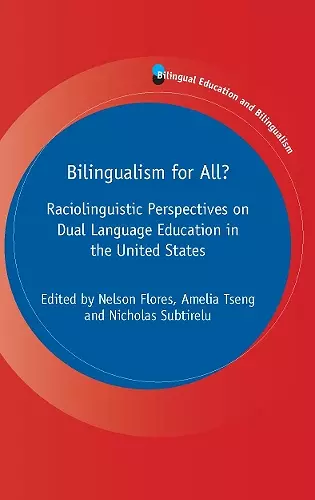Bilingualism for All?
Raciolinguistic Perspectives on Dual Language Education in the United States
Nelson Flores editor Amelia Tseng editor Nicholas Subtirelu editor
Format:Hardback
Publisher:Multilingual Matters
Published:16th Dec '20
Should be back in stock very soon
This hardback is available in another edition too:
- Paperback£42.95was £42.95(9781800410039)

Calls into question the progressive and socially transformative nature of dual language education in the US and demonstrates the ways that the system often maintains and even exacerbates existing racial hierarchies
This book adopts a raciolinguistic perspective to examine the ways in which dual language education programs in the US often reinforce the racial inequities that they purport to challenge. The chapters adopt a range of methodologies, disciplines and language foci to challenge mainstream and scholarly discourses on dual language education.
It is common for scholarly and mainstream discourses on dual language education in the US to frame these programs as inherently socially transformative and to see their proliferation in recent years as a natural means of developing more anti-racist spaces in public schools. In contrast, this book adopts a raciolinguistic perspective that points to the contradictory role that these programs play in both reproducing and challenging racial hierarchies. The book includes 11 chapters that adopt a range of methodological techniques (qualitative, quantitative and textual), disciplinary perspectives (linguistics, sociology and anthropology) and language foci (Spanish, Hebrew and Korean) to examine the ways that dual language education programs in the US often reinforce the racial inequities that they purport to challenge.
In this volume, Flores and colleagues challenge the uncritical, celebratory framing of dual language programs in the United States through a raciolinguistic perspective. The contributors offer a timely and incisive analysis of the discourses around the intersections of race, class, language, ability, and power that perpetuate colonial ideologies and practices in these programs, and offer transformative proposals for moving us forward. A must-read tour de force for anyone interested in equity in schooling and bilingual education.
* Shondel Nero, New York University, USA *This illuminating volume is an indispensable read for understanding how raciolinguistic ideologies work and how they frame bilingual education. Attending to intersections of language, race, disability, and class, the authors in this collection offer much-needed critical and cutting-edge analyses of a wide array of programs and practices. Their work boldly asks us to reconsider the aims of bilingual education and disrupt deeply entrenched white supremacy in schools.
* Patricia Baquedano-López, University of California, Berkeley, USA *This collection points to the hidden injustices of racial inequality in bilingual education in the United States. It is an important read for anyone (teachers, parents, administrators) interested in making dual language education accessible to everyone.
-- Louise Lemaître, OISE, University of Toronto, Canada * Language in Society 50 (2021) *While this reader is compiled of multiple manuscripts that could and do stand alone, the synthesis of raciolinguistics across a plethora of contexts is what makes this book in its entirety a wonderful contribution to the field of DLE and a guide-like handbook for readers. It is a must-read for anyone interested in raciolinguistics in dual language and for those tasked with dual language program development and sustainability.
* Reka C. Barton, Sand Diego State University, USA, Language PolicyISBN: 9781800410046
Dimensions: 234mm x 156mm x 19mm
Weight: 627g
296 pages